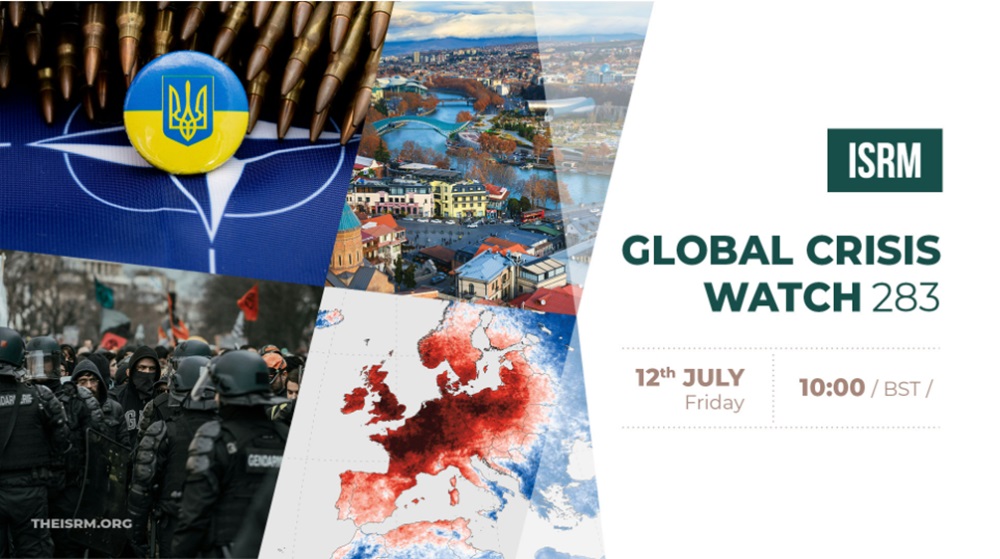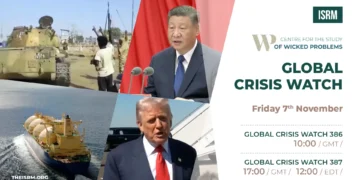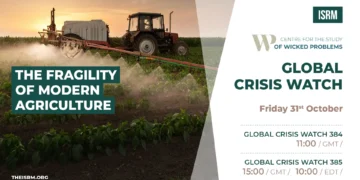The Institute of Strategic Risk Management, (ISRM), has sent out its invitation to this week’s Global Crisis Watch, #283, taking place on Friday, July 12 at 10:00 BST. Topics this week will include the new NATO summit offering support to Ukraine, the rise of far-right politics in France, the EU suspending Georgia’s path into the EU, and the current record-breaking heatwave gripping parts of Europe. Read more about the topics below.
A new NATO summit gives support to Ukraine
World leaders gathered in Washington, D.C., for a crucial NATO summit, with a focus on ramping up military support for Ukraine amid escalating Russian missile strikes. The summit, which included Britain’s Prime Minister Keir Starmer and Ukraine’s President Volodymyr Zelenskiy, is expected to result in a new aid package for Ukraine. This includes additional Patriot air defense systems and progress on providing F-16 fighters to bolster Ukraine’s defenses. A senior NATO official warned that Russia might increase missile attacks on Ukraine to divert attention from the summit, exemplified by the recent devastating strike on a children’s hospital in Kyiv.
The NATO summit comes against the backdrop of significant concerns regarding the ongoing war in Ukraine and its implications for global security. While there will be no substantial progress on Ukraine joining NATO during this meeting, alliance members aim to present the new support package as part of a “bridge to membership.” U.S. President Joe Biden pledged support for Ukraine, emphasising NATO’s unity and strength. The Leaders are hoping to “Trump proof” NATO support for Ukraine in fears of him winning the election in Autumn, by creating mechanisms that he couldnt cancel if he wins, ensuring continuing support for Ukraine. The leaders are keen to avoid conflicts within the alliance, particularly after Zelenskiy’s previous outburst over slow progress towards membership. With the war expected to extend beyond 2025, NATO underscores its commitment to supporting Ukraine in the long term.
The French elections lead to concerns over the rise of the far right
A record number of far-right MPs from the National Rally party have entered the French National Assembly following the recent legislative elections. Despite a surprising defeat to the left-wing coalition New Popular Front (NFP) and French President Emmanuel Macron’s centrist alliance, the National Rally, led by Marine Le Pen, increased its representation from 89 to at least 123 seats. This makes the party a significant force in the assembly, capable of influencing government stability by blocking any left-wing prime minister.
The legislative elections resulted in a fragmented assembly, with the NFP holding 193 seats, Macron’s centrists with 164, and the National Rally with 123. The left-wing coalition, while holding the most seats, is well short of the 289 needed for a majority. This has led to an uncertain political landscape, with calls for potential dissolution and new elections. National Rally MP Philippe Ballard described the situation as a “quagmire” and suggested another dissolution as the only viable solution. The first session of the new lower house is set for July 18, amidst ongoing coalition talks and strategic positioning by all major political groups.
EU suspends Georgia integration
European Union leaders have announced that Georgia’s path to EU membership is on hold due to a controversial foreign influence law, which has sparked significant opposition and protests within the country. At a summit in Brussels, EU officials condemned the law, likening it to a similar Russian law aimed at stifling dissent. The law mandates that media and non-governmental organisations receiving over 20% of their funding from abroad must register as “organisations acting in the interest of a foreign power”, undergo strict audits, or face punitive fines. This move is seen as a major step back for Georgia, which was granted EU candidate status in December 2023 with a set of reforms to fulfil. The EU has expressed solidarity with the Georgian people and urged the government to reverse its course to resume the accession process.
Georgian President Salome Zourabichvili has blamed the government for the EU’s decision, criticising the anti-European rhetoric of the ruling “Georgian Dream” party. The EU’s Ambassador to Georgia, Pawel Herczynski, indicated that the law and the government’s stance have halted Georgia’s integration into the EU. The EU has also frozen €30 million allocated to support Georgia’s Defence Forces. Protests against the law have led to threats and assaults on activists, opposition politicians, and NGO workers, prompting EU leaders to call for an end to such intimidation.
Record breaking heatwave in Europe
Europe is experiencing extreme weather patterns with the north facing below-average temperatures and heavy rainfall, while the south is battling intense heat waves and wildfires. This has resulted in record rainfall in Belgium, floods, and less sunshine in the north, whereas southern regions like Greece, Cyprus, and Italy are seeing temperatures 10°C above average, leading to heat-related deaths and wildfires.
Experts attribute these extremes to climate change and phenomena like El Niño and La Niña, urging European leaders to take swift action. The European Travel Commission reports a decline in tourists to southern Europe due to these climate concerns, with many travelers now seeking cooler destinations or changing their travel habits to avoid extreme weather.
To register, click here
For more ISRM news, click here





